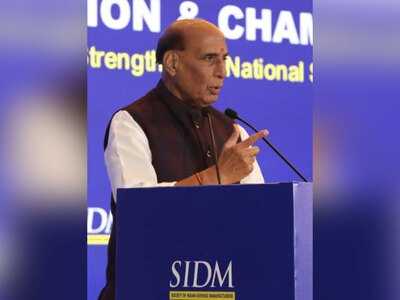New Delhi [India], October 27 (ANI): Defence Minister Rajnath Singh on Monday said the effective use of Made-in-India equipment by the Armed Forces during Operation Sindoor bolstered India's reputation both regionally and internationally. He also urged the domestic industry, especially the private sector, to further accelerate the pursuit of self-reliance by focusing on innovation and R&D, technology-based manufacturing, production of individual subsystems and components, and dominating the supply and maintenance chains, the Ministry of Defence said in a release.
The Defence Minister was addressing the Society of Indian Defence Manufacturers (SIDM) Annual Session, organised on the theme 'Defence Self-Reliance: Strengthening National Security through Indigenous Industry', in New Delhi.
He asserted that the world witnessed the power of Akash missile system, BrahMos, AkashTeer Air Defence Control System and other indigenous equipment/platforms during Operation Sindoor, and the credit of the operation's success goes to the brave Armed Forces as well as "Industry warriors" who worked on the front lines of innovation, design, and manufacturing.
He described the Indian industry as one of the most important pillars of defence alongside the Army, the Navy and the Air Force.
"Although we gave a firm response with a firm resolve and our forces are fully prepared to defend the country's borders, we must continue to introspect. Operation Sindoor should serve as a case study from which we can learn and chart our future course. This incident has once again shown us that anything can happen at our borders, anywhere, at any time. We need to be ready for a war-like situation, and our preparedness must be based on our own foundation," said Singh.
He emphasised that the present-day global uncertainties call for an in-depth assessment of every domain, with 'indigenisation' being the only way to deal with the challenges emanating from the constantly evolving defence sector and the nature of warfare. "The established world order is weakening, and conflict zones are increasing in many regions. It has, therefore, become necessary for India to redefine its security and strategy," he said.
Singh pointed out that the Government, led by Prime Minister Narendra Modi, is creating a level-playing field to enhance defence manufacturing and strengthen the domestic ecosystem, and the industry must make full use of this opportunity.
"We're striving to ensure that the defence equipment is not just assembled in the country, but a real manufacturing base is established to create the equipment embodying the spirit of 'Made in India, Made for the World'. Numerous initiatives such as the Quantum Mission, Atal Innovation Mission, and the National Research Foundation have been taken to develop a culture of innovation and R&D. Our industry must accomplish what has not yet been achieved in the country," he said.
Highlighting the progress achieved due to the Government's self-reliance efforts, he stated that, before 2014, India was completely dependent on imports for its security needs, but today it is manufacturing the defence equipment on its own soil.
"Our defence production, which was only around Rs 46,000 crore in 2014, has now increased to a record Rs 1.51 lakh crore, of which Rs 33,000 crore has been contributed by the private sector. Our defence exports, which were less than Rs 1,000 crore 10 years ago, have touched a record approx. Rs 24,000 crore. I'm confident that defence exports would reach Rs 30,000 crore by March 2026. We recently launched Defence Procurement Manual 2025 and work is underway to revise the Defence Acquisition Procedure 2020," he said, urging the private sector to increase its contribution to the domestic defence manufacturing from the current around 25% to at least 50% in the next three years.
To further increase indigenisation, Singh urged the industry to strive towards dominating supply chains and maintenance chains while focusing on indigenous manufacturing of individual subsystems and components, and not just complete platforms.
"In today's times, when we purchase major equipment from abroad, its maintenance, repair, overhaul, and spare parts management have significant financial implications throughout its life cycle. This puts a strain on our resources and perpetuates dependence on other countries. As a platform that contains a large number of components and inputs, indigenous manufacturing of these subsystems can help increase our indigenous content. We must ensure that 'our soil, our shield' becomes our first choice," he said.
He added that the objective should not be merely to assemble in India, but rather to develop technology-based manufacturing within the country. "We must ensure that any technology transfer is effective and also serves as a means of empowering our indigenous industries," he said.
Stating that no country can progress without innovation and R&D, Singh exhorted the industry to develop large-scale, end-to-end technological products as SIDM completes a decade next year. "Through iDEX and ADITI, our young innovators and industrialists are given challenges/problem statements. The industry should now take up a challenge to develop large-scale end-to-end technological products and bring them to us. We will discuss them and fill the gaps. Our effort is to collaborate with the private sector and move forward. If we work together, the entire landscape of the defence sector will transform," he said, extending the Government's full support.
Defence Secretary Rajesh Kumar Singh, President SIDM Rajinder Singh Bhatia, Director General SIDM Ramesh K, former SIDM President SP Shukla, senior officials of the Armed Forces & Ministry of Defence, Industry leaders and young entrepreneurs were present on the occasion. (ANI)
You may also like

Indian expat wins UAE's biggest Dh100 million jackpot, plans supercar and 7-star hotel stay

UAE Land Forces' Commander on India visit, briefed on 'Op Sindoor'

Sean 'Diddy' Combs' prison release date announced: 5 major events in his legal battle behind bars

Gujarat CM monitors statewide impact of unseasonal rainfall

"ECI doing its duty": West Bengal Governor welcomes 2nd phase of SIR







